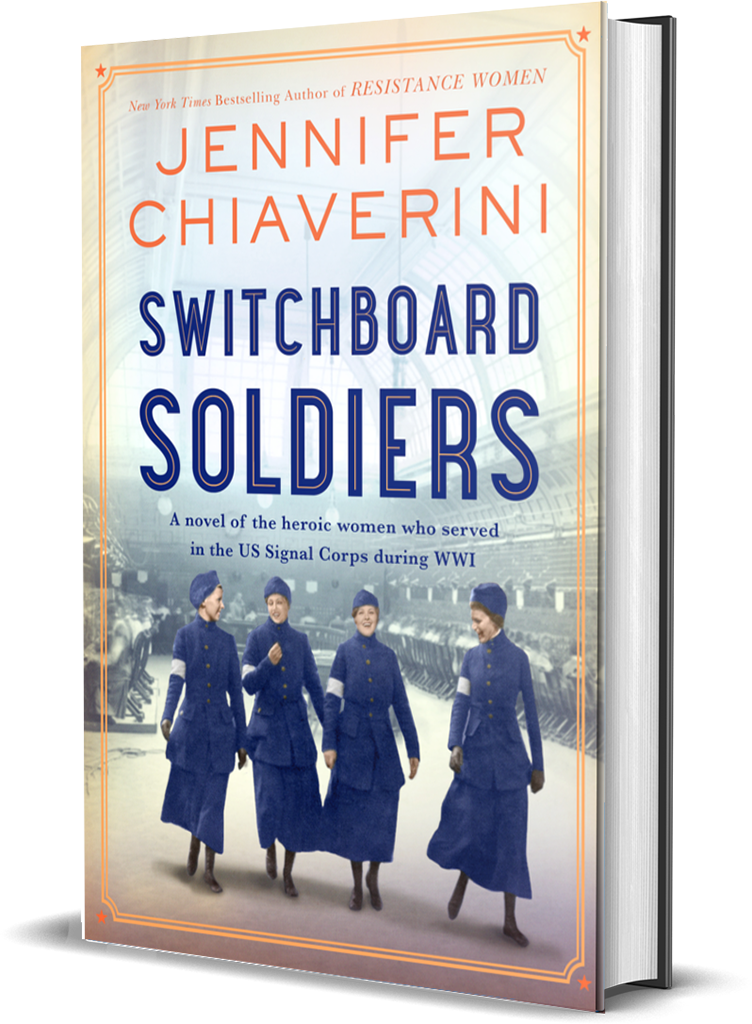
Canary Girls
An Amazon Editors’ Pick — Best Literature and Fiction, August 2023
Early in the Great War, men left Britain’s factories to enlist and arsenals hired women to replace them. Their recruiting slogan: Be the Girl Behind the Man Behind the Gun.
Thousands of women—cooks, maids, shopgirls, and housewives—answered their nation’s call. These “munitionettes” worked grueling shifts handling explosives with little protective gear.
Among them is teenage housemaid April Tipton. Impressed by the job’s higher wages, comfortable lodgings, and plentiful meals, she takes a job at Thornshire Arsenal near London, filling shells in the Danger Building—difficult, perilous, and absolutely essential work.
Joining April and her friend Marjorie—another former housemaid—is Lucy Dempsey, wife of Daniel Dempsey, Olympic gold medalist and star forward of Tottenham Hotspur. With Daniel away serving in the Footballers’ Battalion, Lucy resolves to do her bit to hasten the end of the war. When her coworkers learn she is a champion footballer’s wife, they invite her to join the arsenal ladies’ football club, the Thornshire Canaries.
The Canaries soon acquire an unexpected fan in the boss’s wife, Helen Purcell, who is deeply troubled by reports that Danger Building workers suffer from serious, unexplained illnesses. One common symptom, the lurid yellow hue of their skin, earns them the nickname “canary girls.” Suspecting a connection between the canary girls’ maladies and the chemicals they handle, Helen joins the arsenal administration as the munitionettes’ staunchest, though often unappreciated, advocate.
The football pitch is the one place where class distinctions and fears for their men fall away. As the war grinds on and tragedy takes its toll, the Canary Girls persist despite the dangers, proud to serve, determined to outlive the war and rejoice in victory and peace.
Praise for Canary Girls
Read an Excerpt from Canary Girls
Chapter Five
July 1915
April Tipton
Eight weeks passed without any word from Marjorie. In the aftermath of her sudden departure from Alderlea, Mrs. Wilson had wrung April dry of information, asking where Marjorie had gone, how long she had been planning to quit, whether April had known, if she had tried to persuade Marjorie to stay, if not why not, if April understood what a dreadful thing it was to throw a household’s smooth operation into chaos by quitting without properly giving notice—
“Don’t scold me, ma’am,” April finally exclaimed when she couldn’t endure the interrogation any longer. “I’ve done nothing wrong. I’m still here!”
Mrs. Wilson fixed her with a hard, level stare. “Indeed you are, and until I can hire a new housemaid, the duties of four will be divided among three.”
With that, April was dismissed. Setting her jaw so she wouldn’t talk back, she bobbed a stiff curtsey and got back to work. It wasn’t fair that she had to suffer the resentment of the entire household because she was Marjorie’s best friend and Marjorie herself was out of reach. Wasn’t it punishment enough that April would now have one-third of Marjorie’s work added to her usual duties, without an equal increase in pay? Perhaps she too ought to be furious with her absent friend, but she couldn’t be, not when everyone’s surly behavior proved that Marjorie had been quite right to go. Not sneaking off in the middle of the night like a prisoner fleeing a cell—that was badly done—but taking another job if she wished. Why shouldn’t she, especially if she contributed to the war effort? It was impossible to miss the newer posters in the village scattered among those urging men to enlist, the ones practically begging girls to take jobs in industry and agriculture. “On Her Their Lives Depend,” one declared, calling on women to become munitions workers. “Be the Girl Behind the Man Behind the Gun,” another entreated. Which was more important: ridding the floors of Alderlea of every last speck of dust, or building the weapons the Tommies needed to fight the Germans?
April hoped the answer was obvious. Even if the Rylances considered only their own son’s safety, they should support any measure that kept Great Britain’s military forces amply supplied.
April was aware of the urgent and growing need for war workers only because Mrs. Wilson had permitted her to run errands to the village again, not because the incident with young Peter Bell was forgiven, but out of necessity. No other servants could be spared. Soon after Marjorie quit, two footmen and a groom had resigned in order to enlist, further reducing the staff even as billeting the soldiers increased everyone’s workload. At that rate, by December, neither the housemaids nor the footmen would be able to put together a side for the Boxing Day football match. Perhaps that was just as well. Marjorie had been the housemaids’ goalkeeper, and they didn’t stand much of a chance without her.
April thought of her fellow Alderlea servants every time she spotted a particular poster near the village hall. Titled “Five Questions to Those Employing Male Servants” and unadorned by pictures, it offered a list asking whether chauffeurs, gardeners, and other staff shouldn’t be putting their skills to use in service to their country rather than a single estate or household. “A great responsibility rests on you,” a caption at the bottom admonished employers. “Will you sacrifice your personal convenience for your Country’s needs?”
April could well imagine Lady Rylance haughtily replying, “No, indeed we shall not.” Yet as far as April knew, their consent wasn’t required. Likely the new recruits from Alderlea had seen the poster and realized for themselves that Britain needed them more than the Rylances did. Or maybe, like Marjorie, they had glimpsed opportunity and adventure elsewhere and had decided to pursue them.
Whatever it was that had inspired them, April marveled at their daring. In comparison, she was dutiful, safe—and as dull as dirt. Her mum and elder siblings would have reminded her that she had a guaranteed wage and a roof over her head, which was more than some people could say, so she ought not to complain. But it was hard to stay stuck when friends were setting off on adventures and she never ventured any further than the nearest village.
Often when April was sent there on errands, she collected the post. On one such day in late May, she spotted a letter in the bundle, postmarked from London and addressed to her in unfamiliar handwriting. She longed to pause at the footbridge and tear open the letter on the spot, but Mrs. Wilson and the cook were impatiently awaiting her return, so she tucked her letter into her pocket, hastened through the errands, and hurried back to Alderlea as fast as she could with the heavy market basket weighing down her arm.
Later, after luncheon, when she was meant to be mending a soldier’s torn trouser cuff and replacing a lost button on the master’s favorite riding coat, she waited until the other servants had left the room. Then she draped the pile of mending on her lap, concealed the letter within the folds of fabric, and eagerly read.
The letter was, as she had hoped and expected, from Marjorie. “I hope this letter finds you well, dear friend,” her friend wrote cheerfully. “I hope it finds you full stop, and that Mrs. W doesn’t throw it on the fire on sight, the bitter old crone! Sorry, I should scratch that bit out. I forgot she’s your auntie.”
“My mum’s cousin,” April murmured out of habit, glancing up from the page to make sure no one had overheard. Marjorie wrote exactly the way she spoke, airily with a bit of cheek. April could almost hear her voice as she read on.
Marjorie was doing wonderfully well, she wrote. Leaving Alderlea had already proven to be the best decision she’d ever made. She had found work at Woolwich Arsenal, a vast factory complex on the south bank of the Thames in southeast London. She had started out in custodial, sweeping up metal filings that fell around the machines that made shell casings, but after proving herself to be prompt, tireless, and reliable, she had recently been promoted to making fuse caps. “It’s a bit dull and repetitive,” she admitted, “but you pick up speed once you get used to it, and it’s easier on the knees than scrubbing floors. I only make caps, not a whole shell. No one makes an entire shell alone. Everyone makes their own small part and someone further down the line puts them all together. So I never see the shell-cases being made or a finished shell with my little perfectly made cap firmly in place, but I know it’s there, and that’s enough for me!”
She worked six days a week, from seven in the morning until seven at night, with one hour off for lunch and a half hour for tea. Other munitionettes worked the exact opposite hours, on the night shift. The various departments staggered their shifts so that not all of the thousands of workers were arriving and departing at the same time. “Some of the girls grouse about the twelve-hour shifts,” Marjorie wrote, and April imagined her rolling her eyes. “Isn’t that comic? With the breaks, we work only ten and a half. It’s clear some people have never had to rise at half four, and work fourteen hours or more, and then drag themselves up three flights of narrow stairs and collapse into a cot in the attic, too tired even to dream.”
Neither did Marjorie, anymore. Now she shared a cozy room with another girl in a hostel reserved for Woolwich munitionettes. She had a bed to herself—a proper bed, not a cot—and a small bureau of her own and the entire left half of the wardrobe. “I don’t have enough clothes to fill it properly yet,” she noted, “but I soon may, the wages are so good.”
How good? April wondered, feeling the tiniest prick of envy.
The hostel was too far from the arsenal to walk without adding hours to the trip, but it was impossible to find affordable rooms any nearer. Houses had been built for munitions workers on the Well Hall Estate, but those had filled up long ago, and newer workers had to find lodgings further and further out. “Our landlady wakes us at five o’clock,” explained Marjorie, “and we snatch a hasty breakfast before dashing out the door at half five to catch the tram. It’s not so bad, really.”
Not so bad? What a luxury it would be, April thought wistfully, to have an extra half hour of sleep every morning!
It was a long, tiring journey to and from the arsenal on the overcrowded trams, but Marjorie traveled with her new friends and they made a merry time of it, gossiping and laughing together as they rode, smiling and chatting with the Tommies if any happened to be on board, so handsome and dashing in their uniforms. Sometimes the soldiers asked the girls to write to them, and sometimes the munitionettes agreed. Marjorie already had two pen pals and her roommate had three.
“Now you understand why I’ve been too busy to write to you,” Marjorie concluded. “Please ignore my poor example of friendship and write back to me as soon as you can.”
April did as her friend asked, but the Alderlea gossip she shared was embarrassingly dull compared to Marjorie’s adventures. April’s letter contained mostly questions. How had Marjorie managed to get hired without a character from her previous employer? How much better were her new wages, exactly? Was there anything about Alderlea she missed—the lovely countryside, the cook’s delicious meals, anything?
“Only you, dear chum,” Marjorie responded a fortnight later. She then proceeded to describe all the larks she was having with her new co-workers, from songs around the canteen piano at tea to the impromptu football games after lunch and bicycle rides through the park on their days off. Twice she and her roommate had given white feathers to lads in civvies on the tram, embarrassing the hapless shirkers so thoroughly that they had each disembarked at the next stop, red-faced and eyes downcast. Marjorie’s half of the wardrobe no longer looked quite so bare thanks to the lovely cotton summer frock she had just purchased, and she had treated her mum to a gorgeous silk shawl for her birthday. “She adored it, of course,” Marjorie remarked. “She’s quite forgiven me for leaving Alderlea now.”
As for her wages, depending upon the number of hours she worked and whether she took on any overtime, she typically earned around three pounds a week.
April gasped. Three pounds! That was nearly thirty times what April earned as a housemaid, not including room and board and whatever came to her on Boxing Day. No wonder Marjorie could afford larks and finery and gifts for her mum.
But the wages were only part of it, Marjorie explained, turning uncharacteristically earnest. At Woolwich she felt appreciated, and she needed only to hear news from the front to understand just how essential she was to the war effort. She was “The Girl Behind the Man Behind the Gun,” doing her bit for King and Country, respected and admired and independent. No one at Woolwich would dream of calling her anything but Marjorie, her own proper name, except to call her “Miss” or “Dearie” or some other fond nickname, which she rather liked. And while it was true that munitions work was by its very nature dangerous, the risks she took were far less than those her brothers and all the other Tommies faced in France and Belgium.
“There’s always room for one more here at Woolwich, you know,” Marjorie wrote in closing. “Your Auntie will forgive you eventually, just as my mum forgave me. (The gift of a shawl may be required.) Say you’ll come soon, or you may receive a white feather from me in the next post!”
“You wouldn’t dare,” April murmured, aghast. Quickly she folded the letter, slipped it into her apron pocket, and carried on with the mending. It wasn’t fear that kept her from flitting off to London and joining Marjorie in the arsenal—well, fear of her mum and Mrs. Wilson, maybe, but not fear of the job itself. From the sound of it, munitions work was easier than domestic service, the pay was much better, and the girls were treated with respect. Why shouldn’t she go? When she told her mum how much more she could earn as a munitionette, surely she would not object. Mrs. Wilson had hired a girl from the village to replace Marjorie; likely she could find someone to take April’s spot, especially if April gave her two weeks’ notice.
Or maybe one week would be enough. Now that April had made up her mind to go, she was eager to get on with it. She would tell Mrs. Wilson the next morning, after breakfast, and soon thereafter, her own adventure would begin.







